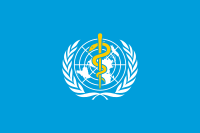
Photo from wikipedia
ABSTRACT Background The COVID-19 pandemic has exacerbated the pre-existing global crisis of physician burnout. Physician and particularly medical educator well-being, has come into focus as educators can influence their own… Click to show full abstract
ABSTRACT Background The COVID-19 pandemic has exacerbated the pre-existing global crisis of physician burnout. Physician and particularly medical educator well-being, has come into focus as educators can influence their own and learners’ well-being. Measuring this construct is one important step towards promoting well-being in the work and learning environments. The 5-item World Health Organization Well-Being Index (WHO-5) has been validated in different populations worldwide for assessing well-being. Yet, its psychometric acceptability remains unexplored among medical educators in Asia including Hong Kong (HK). This study evaluates the validity of the WHO-5 when used among HK medical educators. Method Using data from 435 medical educators, we employed combined within-network (confirmatory factor analysis; CFA) and between-network approaches (correlation and regression) to scale validation. Results CFA results indicated that our data fit the a priori WHO-5 model, suggesting structural validity. Results of comparison of means indicated no gender differences, but there were significant differences when participants were compared by age and professional backgrounds. Resilience predicted well-being as measured by the WHO-5, suggesting construct criterion validity. Conclusions Our findings extend the validity evidence for the WHO-5 to HK medical educators examined in this study. This enables their well-being to be assessed when evaluating the impact of future well-being programmes.
Journal Title: Medical Education Online
Year Published: 2022
Link to full text (if available)
Share on Social Media: Sign Up to like & get
recommendations!